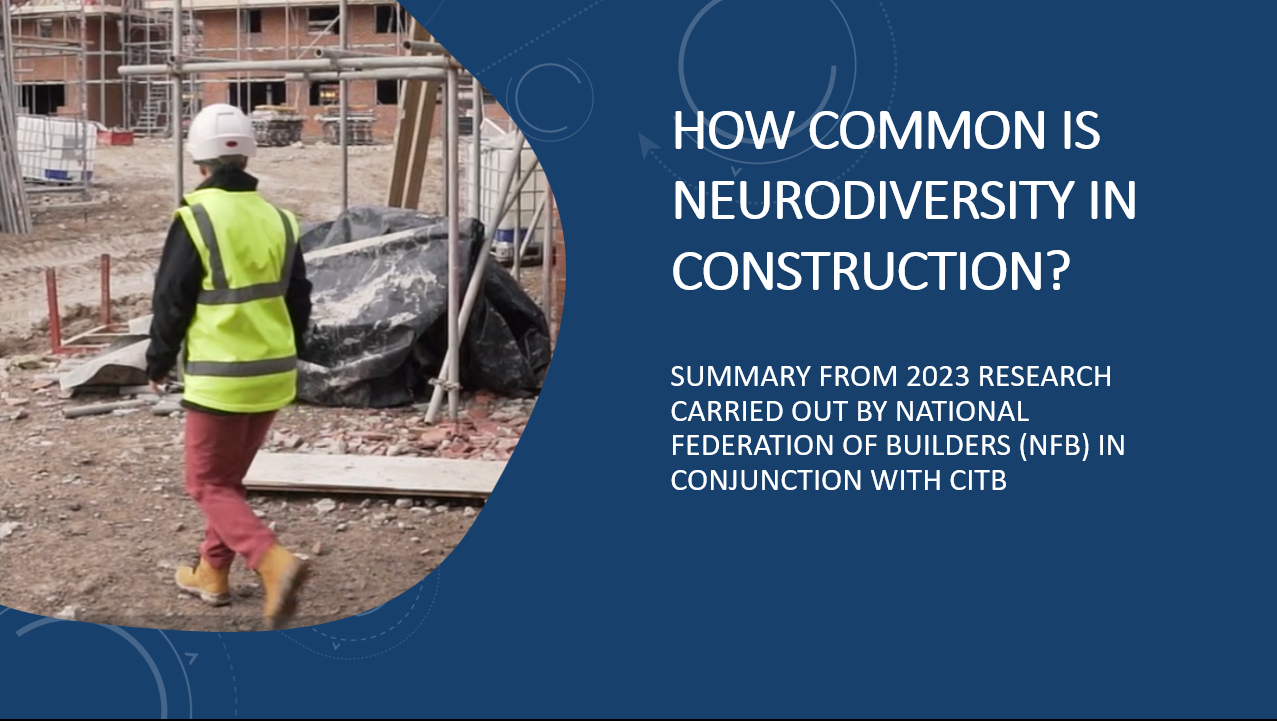
Research shows Neurodiversity is widespread in UK Construction
New research from National Federation of Builders, published in August 2023 in conjunction with CITB, has discovered that neurodiversity is common amongst construction workers in the UK and being neurodivergent is encouraging people to pursue a career in construction.
Also see: Our update to this Article from January 2024
NFB senior vice chair Joe Cook stated “I’m proud our sector is a home to many neurodiverse people and that it attracts neurodiverse people to work in it. That is something we should shout from the rooftops. Let’s do everything we can to make it the most supportive sector too.”
SC4 Carpenters Ltd employs neurodivergent people at all levels from Directors to Carpenters and Decorators on site and believes they bring a lot of benefits to our business.
What is a Neurodiverse workforce?
A neurodiverse workforce contains people with a number of neurodivergent conditions as well as neurotypical people
Some of the most common neurodivergent conditions are:
- Dyslexia (around 1 in 10 adults)
- ADHD (4-5% of population)
- Dyscalculalia (3-6% of population)
- Dyspraxia (3-6% of population)
- Autism Spectrum Conditions (ASC) (1-2% of population)
- Tourettes (<1%)
However, it is thought that around 1 in 5 neurodivergent people are undiagnosed and women are more likely to be undiagnosed than men for many of these conditions
Neurodiversity levels in construction
- 1 in 7 UK people are estimated to be neurodivergent and findings from the NFB report suggest that:
- 1 in 4 UK Construction Workers consider themselves to be neurodivergent
- 1 in 3 Neurodivergent Construction workers said their condition made them want to work in construction
- 2 out of 3 Construction workers believe that the industry is able to support neurodivergent people
What are the Benefits of a neurodiverse workforce?
A neurodiverse workforce means that your business can benefit from the wide range of skills that neurotypical and neurodivergent people have to offer.
As with neurotypical people, the skills and talents of neurodivergent people vary enormously. As they say in the autistic community "if you have met one autistic person, you have met one autistic person". However, particular characteristics and benefits of neurodivergent people can include:
- innovative thinking and unique solutions
- thinking outside the box, lateral thinking and non-linear thinking
- enhanced creativity
- enhanced pattern recognition
- 3D-visualisation skills
- advanced problem solving skills
- enhanced spatial awareness
- passion, empathy, loyalty, diligence and commitment
- highly organised and analytical
- hyper-awareness, hyperfocus and attention to detail
All of which are highly suited to various aspects of the Construction Industry
Is construction a good industry for neurodivergent people?
We can see the clear benefits to Construction that neurodivergent people offer, but is the industry good for neurodivergent people?
Yes, this seems to be the case.
The NFB research found:
- 4 out of 5 workers who responded to the NFB research considered Construction to be supportive of neurodivergent employees
- 3 out of 4 neurodiverse workers said that their fellow workers dealt well with any issues that arose due to their neurodiversity
- 2 out of 3 workers think that the industry is able to support neurodivergent people
Where can I find out more?
- Download the full report from the NFB website
- Find out more in our Diversity in Construction blog
- Our update to this Article from January 2024
Click on the categories below to find out more about:

Connect with Us
Share this Page
More Posts
Recent Posts
- Breathe Easy, Work Safe: The RPE Every Site Worker Needs
- From Site to Strategy: Simon Mead Promoted to Associate Director at SC4
- SC4 named Cala Contractor of the Month, October 2025
- Why is Neurodiversity so important in Construction?
- Our Favourite Carpentry Project Of 2024: Cromwell Court, Old Basing
- Case Study: Timber Frame Installation in Netley Grange, Southampton